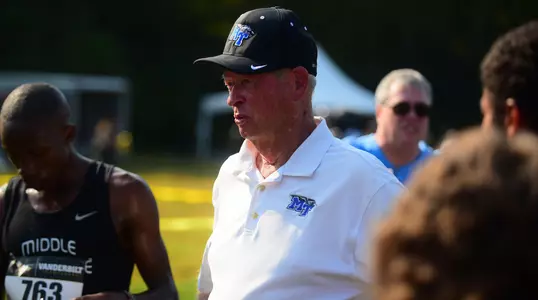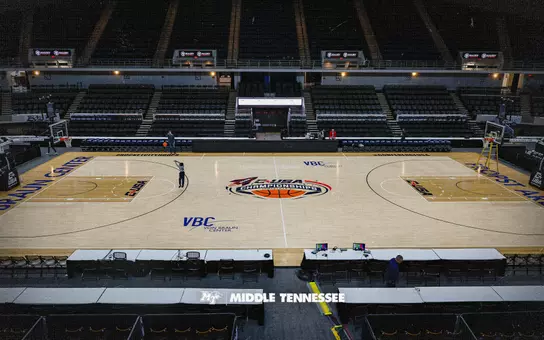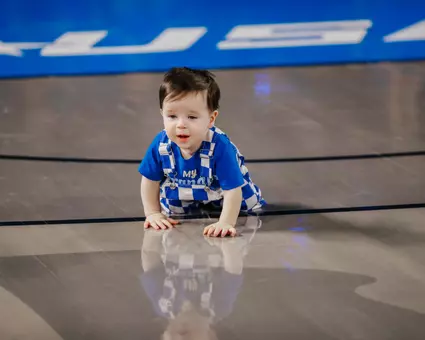Middle Tennessee State University Athletics

Hayes thought he had seen it all
3/21/2020 11:00:00 AM | General
MURFREESBORO, Tenn. – At 82 years of age, longtime Middle Tennessee track and field coach Dean Hayes thought he had seen it all.
Until now.
Born in 1937, Hayes was 8 years old when World War II ended. He has lived through many other wars and skirmishes and been associated with athletes during various Olympic boycotts.
But Hayes had never seen the sports world — professionally and collegiately — brought to a screeching halt until last week due to concerns associated with the coronavirus.
"The closest we came was probably 9-11 when we had delays with Major League Baseball and the NFL postponed its games that week and rescheduled them for later, but in terms of shutting down like we have now, I have never seen anything like it," Hayes said. "I have seen a lot, but I've never really seen anything like this."
The National Basketball Association was first to suspend its season, doing so the evening of March 11. By the following morning, Major League Baseball, the National Hockey League and most every pro sport had followed suit.
College conference basketball tournaments were canceled March 12. Within hours, the NCAA canceled both the men's and women's national championship tournaments.
On that same day, spring sports also were canceled nationwide due to COVID-19.
"This is certainly an unknown for everyone, and you see necessary precautions being taken in the best interest of the student-athletes," Hayes said. "The whole thing with this virus is that it overrides everything. It has taken precedence.
"When the NBA shut down, that's big money nationwide and even internationally. I think that was the key for the NCAA. When the NBA has all of these resources available and their players are still getting it, then I think (the NCAA) looked at it and decided this is too big for us."
Most Americans realized something serious was on the horizon when the NBA suspended its season; however, Hayes said he had suspicions of a much bigger issue well before the news started leaking that events were being canceled.
"You knew trouble was coming. I pay more attention due to the number of international students I have," Hayes said. "I was suspicious much earlier, because I view China as a communist country, and if they have trouble controlling things, what does that mean for the rest of us?"
America is at war, but Hayes said the danger with this war is the unknown.
"We are in a war, but it's a virus we have no control of," he said. "We are fighting something that we don't know what it is with no cure or no vaccine. No one knows how it spreads, so there is panic over that. You don't know who has it or who doesn't. There is a great unknown and that generally causes even more concern. This is unprecedented."
Hayes drew comparisons to the polio outbreak when discussing COVID-19.
"It reminds me of when I was a junior in high school and we had a polio outbreak. That was the 1950s," he said. "The town I lived in (Naperville, Illinois) was hit hard. Our math teacher died and all of the pools were closed because we were spreading it amongst ourselves. A girl in my class caught polio and her left arm was paralyzed. That was a long time ago, and it took time to develop the vaccine. You don't just develop a vaccine overnight.
"This is an invisible enemy, and you probably can't be too careful."
Until now.
Born in 1937, Hayes was 8 years old when World War II ended. He has lived through many other wars and skirmishes and been associated with athletes during various Olympic boycotts.
But Hayes had never seen the sports world — professionally and collegiately — brought to a screeching halt until last week due to concerns associated with the coronavirus.
"The closest we came was probably 9-11 when we had delays with Major League Baseball and the NFL postponed its games that week and rescheduled them for later, but in terms of shutting down like we have now, I have never seen anything like it," Hayes said. "I have seen a lot, but I've never really seen anything like this."
The National Basketball Association was first to suspend its season, doing so the evening of March 11. By the following morning, Major League Baseball, the National Hockey League and most every pro sport had followed suit.
College conference basketball tournaments were canceled March 12. Within hours, the NCAA canceled both the men's and women's national championship tournaments.
On that same day, spring sports also were canceled nationwide due to COVID-19.
"This is certainly an unknown for everyone, and you see necessary precautions being taken in the best interest of the student-athletes," Hayes said. "The whole thing with this virus is that it overrides everything. It has taken precedence.
"When the NBA shut down, that's big money nationwide and even internationally. I think that was the key for the NCAA. When the NBA has all of these resources available and their players are still getting it, then I think (the NCAA) looked at it and decided this is too big for us."
Most Americans realized something serious was on the horizon when the NBA suspended its season; however, Hayes said he had suspicions of a much bigger issue well before the news started leaking that events were being canceled.
"You knew trouble was coming. I pay more attention due to the number of international students I have," Hayes said. "I was suspicious much earlier, because I view China as a communist country, and if they have trouble controlling things, what does that mean for the rest of us?"
America is at war, but Hayes said the danger with this war is the unknown.
"We are in a war, but it's a virus we have no control of," he said. "We are fighting something that we don't know what it is with no cure or no vaccine. No one knows how it spreads, so there is panic over that. You don't know who has it or who doesn't. There is a great unknown and that generally causes even more concern. This is unprecedented."
Hayes drew comparisons to the polio outbreak when discussing COVID-19.
"It reminds me of when I was a junior in high school and we had a polio outbreak. That was the 1950s," he said. "The town I lived in (Naperville, Illinois) was hit hard. Our math teacher died and all of the pools were closed because we were spreading it amongst ourselves. A girl in my class caught polio and her left arm was paralyzed. That was a long time ago, and it took time to develop the vaccine. You don't just develop a vaccine overnight.
"This is an invisible enemy, and you probably can't be too careful."
MTSU Women's Basketball Post Game Press Conference vs Kennesaw State 2/14/26
Sunday, February 15
MTSU Men's Basketball Recap vs Kennesaw State University
Friday, February 13
MTSU Women's Basketball Post Game Press Conference vs Jax State 2/12/26
Friday, February 13
Blue Raider Notebook Presented by TOA - February 9th
Monday, February 09


















